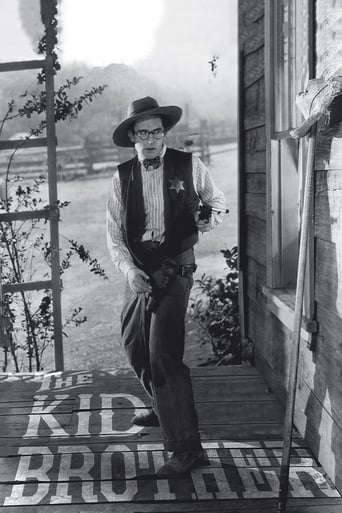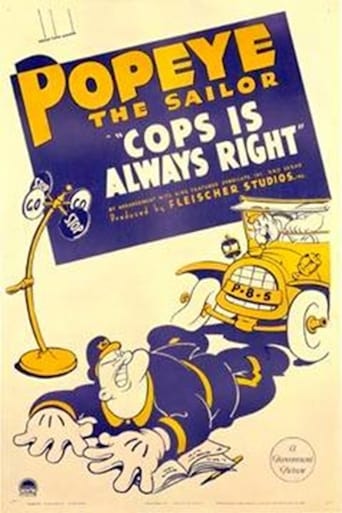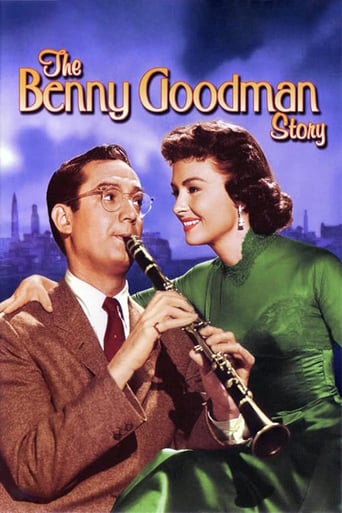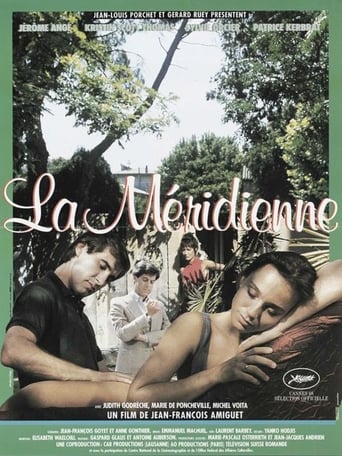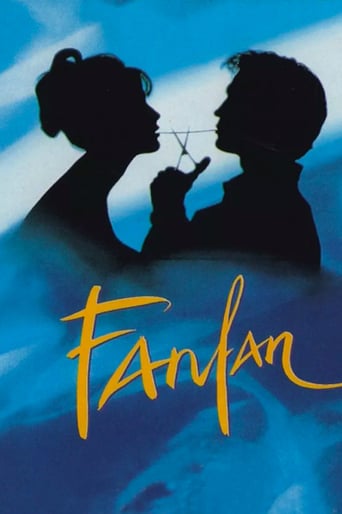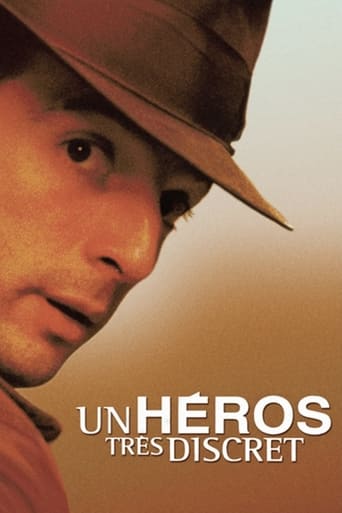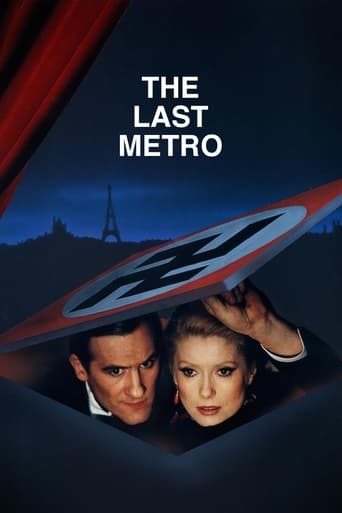


The Last Metro
In occupied Paris, an actress married to a Jewish theater owner must keep him hidden from the Nazis while doing both of their jobs.
-
- Cast:
- Catherine Deneuve , Gérard Depardieu , Jean Poiret , Andréa Ferréol , Paulette Dubost , Jean-Louis Richard , Maurice Risch


Similar titles



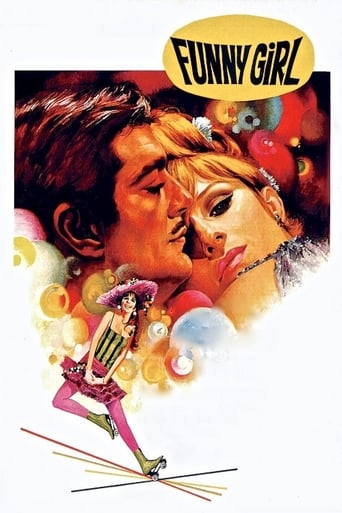
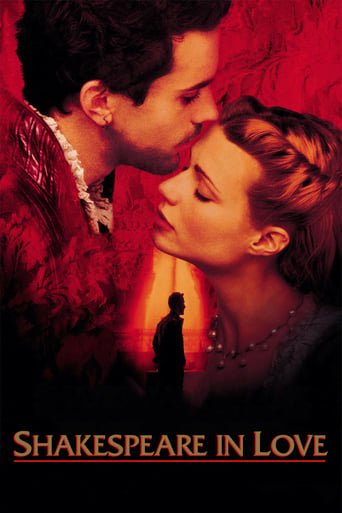

Reviews
I like the storyline of this show,it attract me so much
Powerful
Each character in this movie — down to the smallest one — is an individual rather than a type, prone to spontaneous changes of mood and sometimes amusing outbursts of pettiness or ill humor.
Through painfully honest and emotional moments, the movie becomes irresistibly relatable
"Le dernier métro" was one of Director Francois Truffaut's last works. He only made two more movies afterward before his premature death at the age of 52. Here he got Catherine Deneuve and Gérard Depardieu, which means two of the greatest French actors of all time and one of the greatest directors. Unfortunately it did not turn out as one of the best French movies of all time despite these promising ingredients. The one thing which hurt the film a lot for me was that I did not feel Depardieu and Deneuve had any real chemistry here. I felt much more chemistry between Bennent and Deneuve in fact which is bad as the plot develops completely against their relationship. A minor criticism would be the title. I thought the reference with the last train leaving the station was just too minor to name the whole film after it. In addition, Andréa Ferréol's character did almost nothing for me. She is the reason for Depardieu's character to act so strange early on and her later breakdown due to Deneuve's character becoming more and more difficult to work with just felt unauthentic and randomly thrown in. I don't know what was the purpose behind that or her character in general.The story can be summarized quickly. In World-War-II Paris, occupied by Germans, a group of theater actors work on their newest play. The problem is that the director is Jewish and had to flee. Actually he did not. He lives in the theater's cellar where he is provided with food and information about the political climate by his wife, the lead actress in the play. He finds ways to direct the actors and despite people not knowing he is down there, he manages to make an impact in forming the play while his wife begins to develop feelings for her co-actor.The film was the big winner at the French Film Awards when he came out. It received 10 Césars and only lost the supporting actor/actress categories, but was also nominated there. Consequently, it was France's submission to the Foreign Langue Film category at the Academy Awards that year, where it scored a nomination as well, but lost to the Soviet entry.This is a film really only for those who love French cinema. Then again, others probably won't come across it 35 years after it was made. The common (invalid) criticism that nothing really happens is really the case here. Also it runs considerably over two hours, which means you may become bored if French movies aren't your cup of tea. I liked the Asterix-like introduction (although it certainly was unintended) and the ending where their next play is mixed with reality and I was pretty surprised. Apart from that, the most interesting about this film is the depiction of life in Paris during the German occupation and the many historic references. The music is nice as well. "Bei Mir Bistu Shein" is such a great song.
Even though we are led to believe the film is about the insanity of what Paris was experiencing during the dark days of the German invasion during WWII, in reality is is a work about survival in what these characters we are presented loved most, their beloved theater, now going through hard times because of what was going on all around them.Marion Steiner, a star on her own, has to manage the theater founded by her husband Lucas Steiner, when he flees the country. Being a Jew, he runs a risk of being sent to one of the concentration camps where most of them would die. By pretending he has left to South America, Marion and Lucas' assistant Jean-Loup are presenting a new Norwegian play that would have been Lucas' last directorial venture. The title of the piece, "Disappearance" was in reality written by Steiner and it has a hidden meaning that is only known to his wife.The young Bernard Granger, an actor that was last seen at the Grand Guignol, is engaged to play opposite Marion. Earlier, Bernard has tried to hit on Arlette, whom unknown to him, is the costume designer for the play. Bernard is not aware, or naive not to realize Arlette is a lesbian who cares much more for the ingenue of the piece, Nadine. The company enters the rehearsal period led by Jean-Loup. What no one suspects is that Lucas Steiner is living in the basement of the theater, where Marion goes on a nightly basis for guidance as to how the work progresses as well as for having normal marital relations and to tend for Lucas. The director figures a way where he will be able to follow all what goes on on stage by listening through an air vent that tells him what works and what must be changed.A anti-Semitic critic Daxiat, suspects something is not quite what he sees as he comes, from time to time, to watch what Marion Steiner is doing with the play. Jean-Loup tries to play both ways and tries to be on Daxiat's esteem so the play can get its due. The critic, though, has other ideas, which come clashing with what Marion is trying to do. He even hints that Lucas Steiner is still in France for there is no record of his departure.As the play begins, Bernard realizes he has feelings for Marion, something she clearly rejects. Marion does not encourage the young actor to be anything else, but her co-star. One gets the current between them as they continue to work together. Will what Bernard feels for Marion be returned? What with Lucas Steiner so close? The ending is a bit of a disappointment, and somewhat contrived.Francois Truffaut set his story during WWII, but it actually does not touch too deeply into the conflict itself. It is more about keeping the facade in the way the play is, rather than the menace from the invaders of France. It is a film within a film, a tribute perhaps to the resiliency of those performers that carried out entertaining the people that flocked the theaters, perhaps to keep themselves warm and sane. Truffaut was working with his usual collaborator, Suzanne Schiffman. Nestor Almendros photographed the production which is seen mainly in interior shots done in a studio and special set in an abandoned chocolate factory.Catherine Deneuve plays Marion Steiner with her usual reserve. Gerard Depardieu has some good moments with his Bernard. Andrea Ferreol's Arlette is perfect. Jean Poiret is seen as Jean-Loup, and Heinz Bennent plays Lucas Steiner.
I kind of expected a "Paris under occupation" drama, but this wasn't it, it's more a mixed bag of goods. There isn't a lot of drama, actually, which makes this movie somewhat slow and tedious to watch.The plot: a celebrated Jewish-German theatre director (Heinz Bennent) fails to escape from occupied France, and has to hide in the cellar of his theatre in Montmartre. From down under, he directs another hit play, while his beautiful wife (Cathérine Deneuve) dotes on him. Nevertheless an affair develops between her and the male lead actor, played by Gérard Depardieu, but none of them seem to take it too serious (they're French, after all, except the German director, who seems to have gone native). There's a plethora of side stories, a French collaborateur movie critic, a Jewish girl and lots of lesbians and gays, but they all kind of amble along instead of leading up to something. It's all very farcical, and you never get the impression that anyone is suffering from the war and the occupation. And the eponymous métro is a no-show -- I don't know why Truffaut put it in the title as it has nothing to do with the movie.We probably all expect the director, Lucas Steiner, to be betrayed and to end up in concentration camp. This doesn't happen which makes the movie somewhat offbeat and optimistic, but also a bit pointless. Let's face it, despite this movie earning 10 Césars along rave professional reviews, it's not one of Truffaut's best. So I'd recommend this one mostly to Truffaut completists.
Set in occupied Paris, 1980's "The Last Metro" is about a theater trying to survive in wartime Paris. Lucas Steiner, the German manager and director of the theater, is said to have fled Paris and left his beautiful movie star wife (Deneuve) to run the place in his absence. What no one knows is that Steiner never left - he's hiding in the basement of the theater until Marion can arrange a safe passage for him to the free zone.Marion is unable to hire Jews in her theater and unbeknownst to her hires a very political man, Bernard Granger (Depardieu) as her leading man. The two fall for one another, but Marion doesn't act on her feelings because of her husband. Marion must put up with the anti-Semite critic Daxiat (Jean-Louis Richard), and when Bernard comes down on him for an insulting review, Marion is afraid the theater will be closed and washes her hands of him.This is a film about people living in trying times and attempting to survive and do the work they love while danger lurks everywhere. The photography is beautiful, and the film is done with great style and captures the '40s atmosphere beautifully. Deneueve is breathtakingly beautiful, but all of the faces are so much more interesting than one finds in an American film. A captivating movie - I loved every minute of it.

